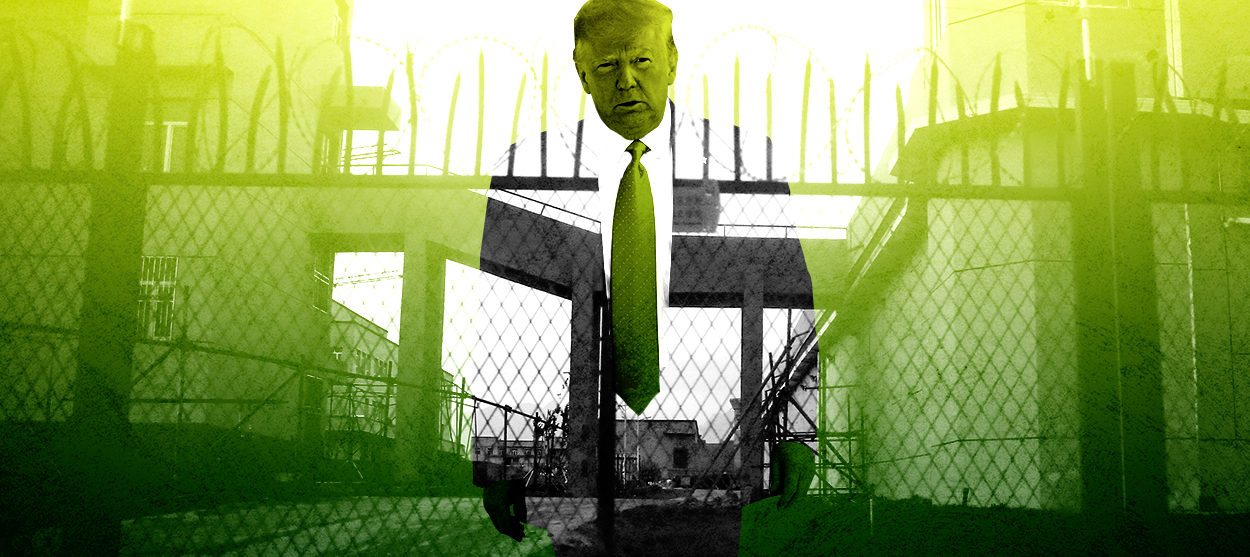The ugly truth of Trump's position on Chinese concentration camps
What he allegedly told Xi reflects the mainstream American consensus


A free daily email with the biggest news stories of the day – and the best features from TheWeek.com
You are now subscribed
Your newsletter sign-up was successful
Have you heard? Another one of those books is coming out, the kind that are meant to be leaked to newspapers, endlessly tweeted about, and forgotten two days after they are published. No one reads them, something that is attested by the hundreds of thousands of immaculate copies gathering dust in Goodwills and the outdoor free piles of bookstores around the country.
This one happens to be by John Bolton. That's the guy with the mustache who left the Trump administration less than a year ago because we didn't go to war with Iran (not to be confused with the clean-shaven guy who left the Trump administration a year and a half ago for the same reason). In the pages that no one save for a handful of credulous senior citizens in community libraries across the country will ever actually open, Bolton apparently says some not very flattering things about the president. He even suggests that Donald Trump does not have particularly enlightened or humane views about various issues and that he lacks empathy. Can you imagine? Anyway, Bolton's revelations are of such vital importance to national security that, instead of testifying during the recent impeachment proceedings, he saved everything for The Room Where It Happened, for which he received a $2 million advance.
One of the things that is getting the most attention from this courageous whistleblower is what the president is alleged to have said about China: namely, that he is indifferent to the fate of as many as one million Uighur Muslims living in concentration camps there. Not to put too fine a point on it, but aren't we all?
The Week
Escape your echo chamber. Get the facts behind the news, plus analysis from multiple perspectives.

Sign up for The Week's Free Newsletters
From our morning news briefing to a weekly Good News Newsletter, get the best of The Week delivered directly to your inbox.
From our morning news briefing to a weekly Good News Newsletter, get the best of The Week delivered directly to your inbox.
I have been writing about this issue, and about the fundamental problems of our relationship with China for years, and nothing has ever given me the impression that there is anything remotely approaching a consensus in favor of bringing Beijing to heel for its human rights abuses. Doing so would require, among other things, taking actions far more drastic than the Band-Aid measures widely decried by liberal journalists as a "trade war," to say nothing of the sanctions tossed out by the administration on Friday, seemingly in response to Bolton's reported comments. It would mean more, not less, bellicose rhetoric, more ships and troops in Japan and South Korea. It would mean accepting vast increases in the prices of most consumer goods and fewer markets for the handful of things we do produce in this country (namely, corn and pork, which is why we have been so reluctant to close our meat processing plants during the pandemic).
China is one of those problems that we are incapable of solving, or even acknowledging. This is because there is no meaningful faction in American public life willing to live with the consequences of what would need to be another Cold War. This is not just because Democrats and Republicans alike are beholden to Wall Street and to the soothsayers in our economics departments who tell us we have no choice but to pursue free trade even as our enemies laugh at us. It is also because we, the American people, want things this way.
We are addicted to the endless supply of plastic junk and to the Chinese slave labor that makes it possible. We are not even curious about what might happen if we were ever made responsible for building our own weapons and airplanes and battleships. We do not especially mind if our military hardware and pharmaceuticals and technology infrastructure are sold to us by a totalitarian regime as wicked as the ones we spent the better part of the last century fighting. And we certainly do not mind what Hollywood and the NBA do to placate the Chinese Communist Party, even as we tell ourselves absurd bedtime stories about the evils of censorship.
So of course we accept the reality of mass imprisonment; of forced labor; of brainwashing and involuntary programs of re-education; of rape, forced contraception, and sterilization; of sickening medical experiments; of mass surveillance and torture. China is our most important trading partner, the source of some $450 billion in annual imports, the buyer of real estate in our major cities, the licensing authority that determines what our filmmakers and athletes are allowed to say and write.
A free daily email with the biggest news stories of the day – and the best features from TheWeek.com
Trump might have told Xi Jinping to go ahead and do what he had to do. But he was speaking on our behalf.
Want more essential commentary and analysis like this delivered straight to your inbox? Sign up for The Week's "Today's best articles" newsletter here.
Matthew Walther is a national correspondent at The Week. His work has also appeared in First Things, The Spectator of London, The Catholic Herald, National Review, and other publications. He is currently writing a biography of the Rev. Montague Summers. He is also a Robert Novak Journalism Fellow.
